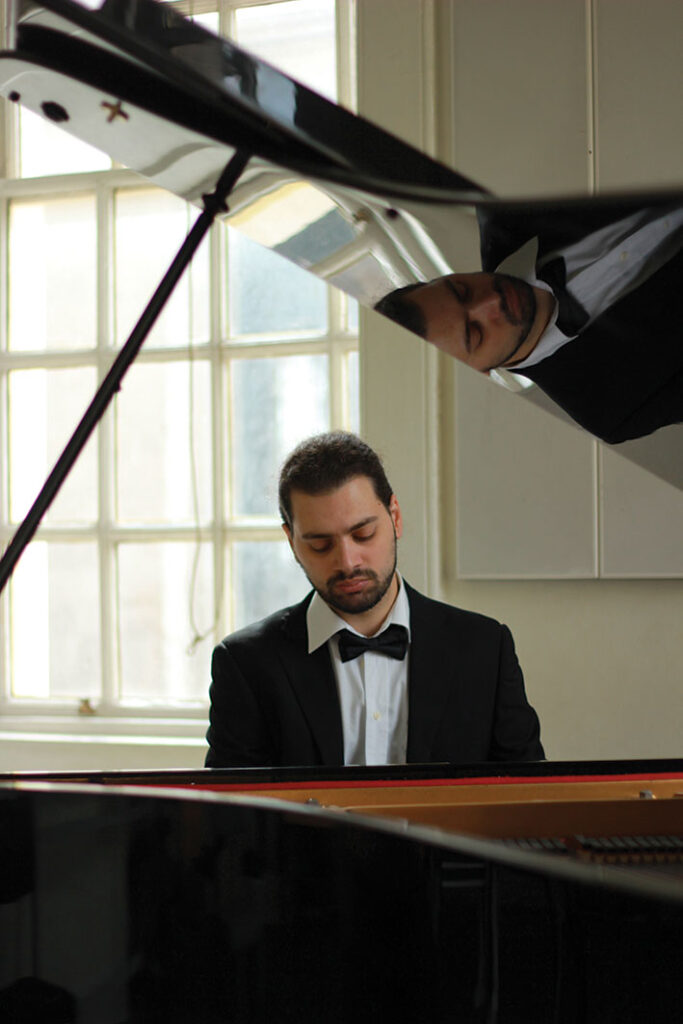The impact of the Coronavirus Pandemic on independent artists and musicians is the worst possible scenario
>> from London to Rome
The coronavirus has wreaked havoc on the livelihoods of musicians and
other artists across the Globe.
Feeling anxious is a normal emotion for everyone these days, since we are living in a very difficult situation. Some people are lonely and sad because things are out of control and every day is unpredictable.
The artist’s life has changed dramatically, especially the life of a musician.
Greats of the music world, like conductor Sir Simon Rattle and violinist Tasmin Little, writing in the Guardian (https://www.theguardian.com/music/2020/oct/25/bail-out-our-musicians-or-risk-losing-them-for-ever-say-classical-music-stars) even go so far as suggesting that without Government financial help, some struggling musicians might be forced to give up music altogether.
This is a tough moment, particularly for a pianist who has to spend hours and hours of practising, unable to socialise, having to dedicate a long time sitting on his stool in front of the instrument.
I have interviewed two professional piano players who not only enchant audiences performing, but also provide music lessons.
Iyad Sughayer and Georgios Vardakis.
They both live in London but have different nationalities and backgrounds.
Iyad is from Jordan, he had his first piano lesson, when he was only four years old. Georgios is from Greece, he has started at the age of twelve but had always been exposed to classical music since he was much younger.
“Music has been with me my whole life and so pursuing a career in music was very natural!” said Iyad.
Can you manage long practise and rehearsal hours considering the tension of this challenging time? And what do you miss the most?
“I love performing! Long practises can be challenging, but they never seem to bother me too much” said Iyad. “Rehearsing with an orchestra is one of my favourite things to do. There is something truly special about making music with a group. And I think this is what I miss the most.” he added.
For Georgios rehearsing is not only about playing, which can be physically exhausting after even a couple of hours.
“It is about sharing knowledge, discussing things and also a lot of planning. What I miss the most is teaching my pupils face to face.”
Coping with virtual emotion and not being able to perform in front of a physical audience. How does it make you feel?
Georgios believes that the relationship with the audience is one of the most interesting parts of a musician’s life.
“You can feel the energy, you can breathe with it and you can move it emotionally, but you never know what they think or feel especially if you perform virtually and this can make you feel nervous sometimes.”
“I try to avoid thinking about the audience when performing, I concentrate on the music only.” explained Iyad.

If you had to choose your most remarkable performance. Which one would it be?
“It was, before the Covid, in June 2019. I was lucky to perform the Khachaturian Piano Concerto with the BBC Philharmonic Orchestra in Manchester. Playing one of my absolute favourite piano concertos with one of Europe’s leading orchestras was a truly special moment for me that I am going to remember for a very long time!” said Iyad.
“There are some glorious performances in Cathedrals that I still remember very fondly, but I think the most memorable one was a private concert in London, where I was playing on an old Steinway D, which Rachmaninoff and Paderewski used for their concerts in London. It was amazing!” said Georgios.
What would you say is your greatest achievement to date?
“Even though I have been involved in many tours, concerts festivals and sponsor scholarships – like Trinity College of Music and Stavros Niarchos foundation-, what really makes me happy, more than anything else, is when I see my pupils’ musical achievements and, this is what I personally call an achievement. We often can have good performances, but to discover a student’s mind, develop it, help to build character, is just something outstanding. What better can we achieve than educating others?” answered Georgios.
“I have to be honest, I’m never truly satisfied and once I complete any project or set of concerts, I cannot wait to start the next one! But If I really have to choose, I am very fortunate to have recorded my first Album last year which contains most of the solo works for piano by the Armenian Composer Aram Khachaturian.” remarked Iyad.
Iyad, do you have any plan for the future?
“I am currently preparing for my second album which will be the Khachaturian Concerto and Rhapsody but who really knows about the future! It is very hard to predict anything at the moment. Although between practising and teaching online; I hope to expand my teaching and eventually re-start planning a busy performing schedule.”
Future is definitely very uncertain, but Georgios, it seems you have a plan. You are running your own piano school in London and attending a research programme at Royal College of Music.
“I am working a lot on developing learning methods based on wellbeing and mind development. At the same time, I am also working on three different hourly repertoires that hopefully will be presented in concerts around the UK in 2021.”
In your opinion, considering the impact of it all, how will musicians face life?
“Arts have survived many bad events in history. I want to remain positive that, no matter how long it takes, things will return to normal.” said Iyad.
“The actual live performances will soon be back and stronger than ever! I am very positive.” Georgios exclaimed with a smile.
*Barbara Panetta, scrittrice
